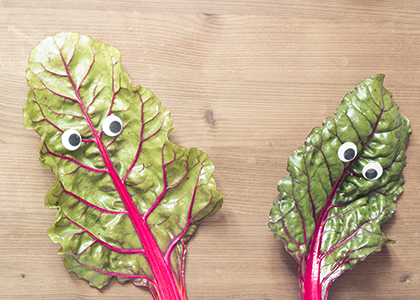
What to Eat for Healthy Eyes
By Isabel Smith, MS, RD, CDN
Our eyes are so crucial to our everyday activities, whether that’s to write this blog post, drive a car, eat our food, commute to work, stop at a crosswalk, etc., so we need to keep them healthy. Typically eye health revolves around methods like wearing glasses for electronic screen use and practicing eye exercise, but one that often goes unmentioned is the importance of what we eat. Both plant and animal-based foods contain tons of nutrients that can help to nourish all of the different parts of our eyes, and can help prevent health issues like age-related macular degeneration and night blindness.
Here are 7 key nutrients that can help keep your eyes healthy (and the foods that contain these nutrients).
Beta-carotene
Beta-carotene is a nutrient that is part of the carotenoid family and acts as a powerful antioxidant in both the body and in the eyes. Specifically, beta-carotene may help to promote night vision and it also helps to prevent and repair cellular damage in the eye.
Foods rich in beta-carotene:
- Carrots
- Sweet potatoes
- Winter squash
- Peppers (red, yellow and orange)
- Broccoli
- Green leafy vegetables
Vitamin C
Vitamin C is known for its powerful boost for the immune system, but its true attribute is as an antioxidant in the body, helping to prevent and fight damage to our cells. Vitamin C is also a precursor to collagen, so it works nicely to help promote skin health. When it comes to the eyes, vitamin C plays a role in helping to reduce the risk for macular degeneration and cataracts.
Foods rich in vitamin C:
- Citrus fruits: lemons, limes, grapefruit
- Berries: strawberries, blueberries, blackberries
- Green leafy vegetables
Vitamin E
Vitamin E is a fat-soluble vitamin that acts as an antioxidant both around the body and in the eyes. Research suggests that vitamin E may also help to slow macular degeneration.
Foods rich in vitamin E:
- Almonds
- Sweet potatoes
- Spinach
- Pumpkin
- Beet greens
- Red peppers
- Asparagus
- Avocado
- Peanut butter
- Mango
- Swordfish
Essential Fatty Acids
Essential fatty acids are those that our bodies cannot make, specifically omega-3 fatty acids. Omega-3 fatty acids get a lot of press because they’re great for us, and for the most part, aren’t abundant in the Western Diet. Omega-3’s (found in both plant and animal sources) are touted for their anti-inflammatory properties that affect both blood vessels and joints to help prevent inflammation, the number one cause of disease. Omega-3 fatty acids help to prevent dry eyes, promote healthy function of the retina and also help with keeping eyes healthy overall.
Foods rich in omega 3 fatty acid:
- Chia seeds
- Flax seeds
- Walnuts
- Salmon and other fatty fish
- Soybeans
- Tofu
- Brussels sprouts
- Cauliflower
Zinc
Zinc is a key nutrient that has many functions in the body like promoting thyroid and immune health but it’s also a key nutrient that may help to reduce the risk for macular degeneration.
Foods rich in zinc:
- Spinach
- Pumpkin and squash seeds
- Cashews
- Cocoa and cocoa powder
- Mung beans
- Mushrooms
- Eggs
- Oysters and shellfish
- Beef
- Poultry
Lutein and Zeaxanthin
Both lutein and zeaxanthin are members of the carotenoid family (like beta-carotene) and research suggests that both lutein and zeaxanthin may help to slow age-related macular degeneration, and may also help to protect our eyes from cataracts.
Foods rich in lutein & zeaxanthin:
- Eggs (lutein only)
- Dark green leafy vegetables
- Green beans
- Brussels sprouts
- Corn
- Oranges and tangerines
- Papaya
- Celery
- Tomato juice
- Peaches
- Carrots
- Melon